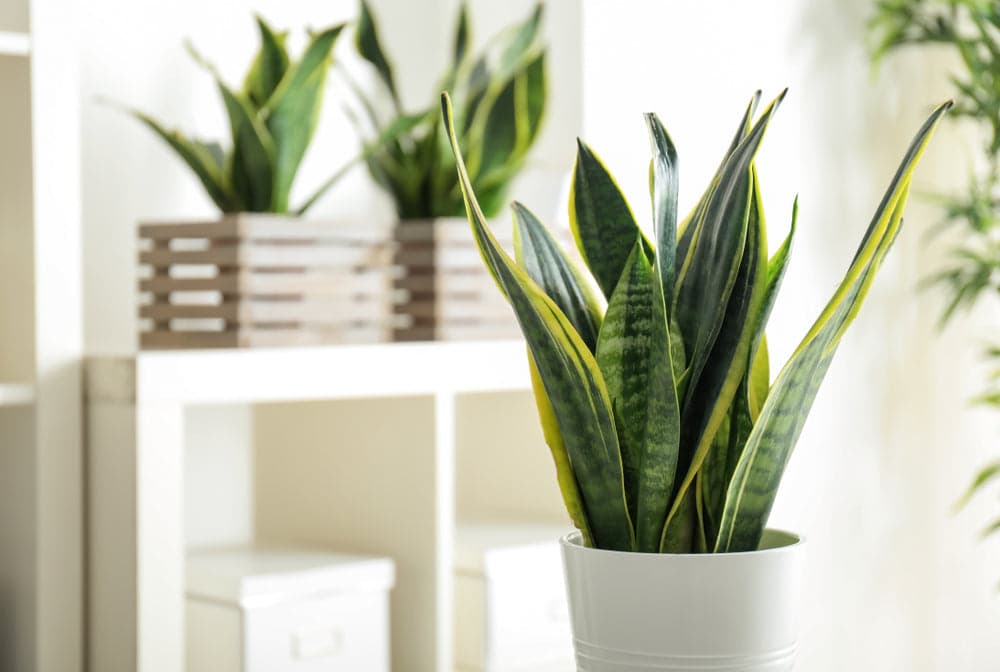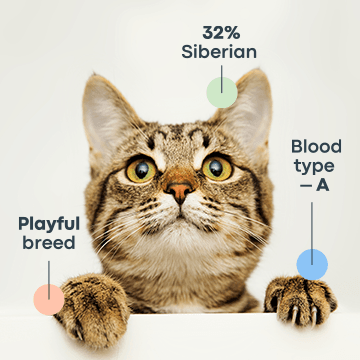The short answer to this question is, yes—snake plants (Sansevieria trifasciata) are indeed toxic to cats. Why are snake plants toxic to cats, and what are signs of snake plant toxicity in cats? Keep reading for the answers to these questions and more. You won’t want to miss out on important information to help keep your cat safe and healthy.
Why Are Snake Plants Toxic To Cats?
The snake plant is also known as Golden Bird's Nest, Mother-in-Law’s Tongue, and the Good Luck Plant. All parts of the plant contain saponin, a toxin that is harmful to cats and can cause illness. Cats most frequently ingest this toxin by chewing on the leaves. While mild reactions are more typical, your cat can experience a range of uncomfortable side effects after ingesting saponin.
Most cats recover well from saponin toxicity, but it’s important to contact your veterinarian immediately for advice and find out if your cat needs to be seen. The Pet Poison Helpline is another helpful resource, especially when it’s after hours or if you’re unable to reach your veterinarian right away.
Symptoms of Snake Plant Poisoning In Cats
How can you tell if your cat has been poisoned by a snake plant? The most common symptoms of snake plant poisoning are nausea, vomiting, and diarrhea. Other clinical signs include lethargy, loss of appetite, swollen mouth or throat, drooling, and abdominal pain or other signs of gastrointestinal upset. Symptoms may vary in severity depending on the cat.
Treating Snake Plant Toxicity in Cats
At Your Veterinary Clinic
Treatment of snake plant toxicity can vary from one cat to the next. Your veterinarian is the expert in this situation and will evaluate your cat’s specific needs.

Some treatment approaches may include supportive care to manage your cat’s symptoms, such as intravenous fluids for treating dehydration or anti-nausea medication to help with any gastrointestinal upset. A veterinarian may also prescribe pain medications for a cat if needed.
At-Home Support
Monitoring of your cat’s symptoms and reaction to any prescribed medications is always important after you return from the veterinarian. The amount of care your cat needs and for how long will depend on the symptoms they experienced after eating the snake plant and your veterinarian’s recommendations. Of course, your cat will also appreciate lots of extra care and love (but you already knew that)!

Keeping Your Cat Safe From Snake Plant Toxicity
If your cat has experienced snake plant poisoning, you’ll naturally want to prevent it from happening again. The good news is that there are some simple things you can do to keep your cat safe and avoid exposing them to toxins from a snake plant.
Gift To A Non-Pet Household
By simply removing the plant from your home, you also remove the threat of snake plant poisoning. A snake plant is quite an attractive plant, so it could make a perfect gift for a friend that doesn’t have pets. This will ensure that your cat doesn’t have another opportunity to make the mistake of eating or chewing on a snake plant’s leaves in the future.
Provide Non-Toxic Plants and Toys
Cats love to explore, and that includes exploring new tastes and textures that plants often provide. You can easily grow safe, indoor cat grass gardens to satisfy your kitty’s taste for chewing on green things. There are different scientific theories about why cats eat grass, and the question remains open to debate.

Catnip toys are also a good option to provide your cat with something to chew, as well as to keep them entertained and encourage exercise. Cats can bore easily, which is another reason that they may chew on inappropriate objects, so providing them with a stimulating environment and different opportunities for play are both approaches to consider.
Other Toxic Houseplants
The Aloe Vera Plant
Aloe vera, or true aloe, is a well known plant that is unfortunately toxic to cats. Gel from the inside of the plant’s leaves is a product commonly found in most households to treat scraps, sunburn, and other minor skin irritations.

The true aloe contains saponins, just like the snake plant. It also contains chemical compounds, called anthraquinones, that are produced by a variety of other plants. These compounds affect your cat’s digestive system and, along with saponins, can cause vomiting, diarrhea, abdominal pain, and other signs of gastrointestinal distress. Other aloe poisoning symptoms include oral irritation, urine that has turned red in color, depression, lethargy, and tremors (though this last symptom is rare). If your cat has ingested parts of an aloe plant, it is important to get your cat veterinary care as soon as possible so that your vet can properly examine and treat your cat.
The Jade Plant
Although the jade plant (Crassula argentea) originates from South Africa, it can be found in households all over the world because of its hardy reputation. Other names include Jade tree, Dwarf rubber plant, Chinese rubber plant, Japanese rubber plant, and Baby Jade. Unfortunately, we don’t know what specific parts of the plant poisons cats, so the entire plant should be off-limits to and keep away from curious felines.

Signs of jade plant poisoning can be sudden and intense. Vomiting may occur in as little as 20 minutes from the time a cat ingests a part of the plant. Typically, what follows is a sudden change in a cats’ behavior. While vomiting and depression are the most common symptoms of jade poisoning, your cat may also experience other serious side effects such as loss of muscle function and a slow heart rate. Get your cat to your veterinarian immediately following any suspicion that they’ve ingested parts of a jade plant.
The “Mother-in-Law” Plant
The Mother-in-Law plant (Monstera deliciosa) is another popular household plant known to be toxic to cats. The plant contains calcium oxalates, which can wreak havoc on your cat’s digestive system and create a lot of discomfort.

Typical signs of poisoning from the Mother-in-Law plant are difficulty swallowing and irritation of your cat’s mouth, tongue, and esophagus. Your cat may also present with excessive drooling, vomiting, and difficulty breathing. These symptoms can be very serious and as in all situations where you think that your cat has ingested a toxin, contact your veterinarian immediately.
_The Peace Lily
_
The peace lily (Spathiphyllum), also known as the Mauna Loa Peace Lily, is toxic to cats. Like the Mother-in-Law plant, it contains calcium oxalates that are not digestible and cause gastrointestinal distress when cats ingest them. The leaves, flowers, and stem of the peace lily plant contain calcium oxalate crystals.

Symptoms of poisoning include excessive drooling, vomiting, oral irritation and pawing at the mouth, and decreased appetite and/or lethargy. As a member of the Araceae family, peace lilies are indeed toxic to cats, but they are less so than many other lilies, such as the Stargazer Lily, Daylily, or the Easter lily that are among the ones listed in this ASPCA blog titled, “Which Lilies Are Toxic To Pets?” Most lilies are extremely toxic to cats—even the pollen from an Easter lily that is licked off the coat of a cat can cause kidney failure and/or lead to death.
Due to the highly toxic nature of lilies, you should always get your cat immediate veterinary care if you suspect that they have ingested any part of a lily plant.
The Pothos Plant
The pothos plant (Epipremnum aureum) belongs to the Araceae plant family. It is also known as Devil’s Ivy, Taro Vine, and Ivy Arum. Like the peace lily and the Mother-in-Law, it contains insoluble calcium oxalate crystals.

Cats can’t digest these crystals, and they typically cause irritation and burning sensations around their mouths, which is one way to know whether they’ve had a taste of the Pothos plant.
Some of the other symptoms your cat could have after nibbling on a pothos plant include swollen tongue and lips, difficulty swallowing, loss of appetite, excessive drooling, and vomiting. Calling your vet for advice should your cat ingest the pothos plant is always important, and you can also call the Pet Poison Helpline or contact Animal Poison Control when you can’t reach your veterinarian.
The image below displays some of the plants we've discussed in this post that are toxic to cats, along with a few others. The ASPCA provides a more comprehensive list of plants that are toxic and non-toxic to pets.

Conclusion
You now know more about snake plants and other toxic plants common to many households, why they are toxic to cats, and signs of toxicity in cats.
We hope that you found this information helpful and that you feel better knowing how to support your cat if you think that they may have ingested parts of a snake plant or other common household plant known to be toxic to your favorite feline.
Frequently Asked Questions
Are Snake Plants Toxic to Cats?
Yes, snake plants are toxic to cats. If your cat has ingested a piece of snake plant, contact your veterinarian right away. If you suspect your pet may have ingested a potentially toxic substance, you can also call the Pet Poison Helpline at 1-855-764-7661 or Animal Poison Control at 1-888-426-4435.
Why Are Snake Plants Toxic to Cats?
Snake plants are toxic to cats because all of their parts contain a toxin called saponin.
How Do I Know If My Cat Has Snake Plant Poisoning?
Your cat may experience symptoms such as nausea, vomiting, abdominal pain, lethargy, excessive drooling, swelling of the mouth, lips, or tongue, and/or diarrhea. The symptoms can vary in severity depending on the cat.
How Do I Keep My Cat Safe From Snake Plant Poisoning?
The best way is to remove the plant from your home and give it to a non-pet household. Providing your cat with plenty of other things to chew on such as safe cat grasses and toys will redirect their attention away from chewing on things they shouldn’t.
Proactive Cat Healthcare With Basepaws
Basepaws DNA tests give you a wealth of actionable information that helps you stay in control of your kitten's health. You want to know your cat—inside and out—and the Basepaws Breed + Health DNA test lets you do just that. Learn about your cat’s breed profile in relation to top 21 purebred breeds. Gain insight on 25 genetic traits associated with your cat’s unique appearance and behavior, as well as potentially life-saving information about their blood type and likelihood of resistance to Feline Immunodeficiency Virus (FIV).
In addition to 43 genetic diseases, Basepaws screens your kitty’s oral health for their current risk of having periodontal disease, halitosis, and tooth resorption. These painful issues are difficult to see, and poor oral health puts your feline family at risk for heart, kidney, and other health conditions. Gain peace of mind with Basepaws and get ahead of diseases before they become advanced—so that your cat can live a better life, even longer.





